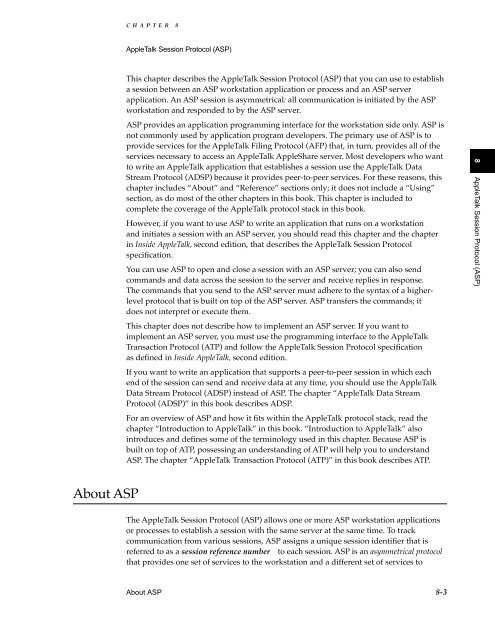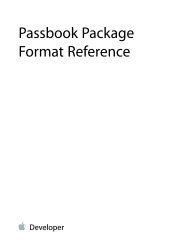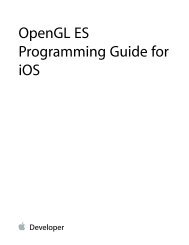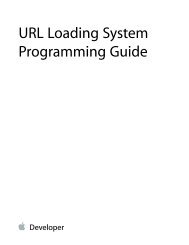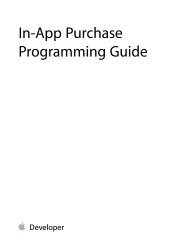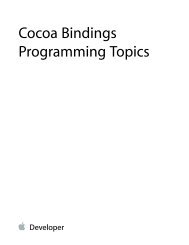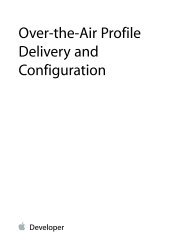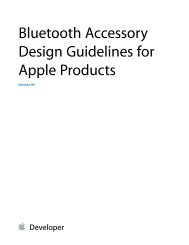IM: N: AppleTalk Session Protocol (ASP) - Apple Developer
IM: N: AppleTalk Session Protocol (ASP) - Apple Developer
IM: N: AppleTalk Session Protocol (ASP) - Apple Developer
You also want an ePaper? Increase the reach of your titles
YUMPU automatically turns print PDFs into web optimized ePapers that Google loves.
CHAPTER 8<br />
<strong><strong>Apple</strong>Talk</strong> <strong>Session</strong> <strong>Protocol</strong> (<strong>ASP</strong>) 8<br />
This chapter describes the <strong><strong>Apple</strong>Talk</strong> <strong>Session</strong> <strong>Protocol</strong> (<strong>ASP</strong>) that you can use to establish<br />
a session between an <strong>ASP</strong> workstation application or process and an <strong>ASP</strong> server<br />
application. An <strong>ASP</strong> session is asymmetrical: all communication is initiated by the <strong>ASP</strong><br />
workstation and responded to by the <strong>ASP</strong> server.<br />
<strong>ASP</strong> provides an application programming interface for the workstation side only. <strong>ASP</strong> is<br />
not commonly used by application program developers. The primary use of <strong>ASP</strong> is to<br />
provide services for the <strong><strong>Apple</strong>Talk</strong> Filing <strong>Protocol</strong> (AFP) that, in turn, provides all of the<br />
services necessary to access an <strong><strong>Apple</strong>Talk</strong> <strong>Apple</strong>Share server. Most developers who want<br />
to write an <strong><strong>Apple</strong>Talk</strong> application that establishes a session use the <strong><strong>Apple</strong>Talk</strong> Data<br />
Stream <strong>Protocol</strong> (ADSP) because it provides peer-to-peer services. For these reasons, this<br />
chapter includes “About” and “Reference” sections only; it does not include a “Using”<br />
section, as do most of the other chapters in this book. This chapter is included to<br />
complete the coverage of the <strong><strong>Apple</strong>Talk</strong> protocol stack in this book.<br />
However, if you want to use <strong>ASP</strong> to write an application that runs on a workstation<br />
and initiates a session with an <strong>ASP</strong> server, you should read this chapter and the chapter<br />
in Inside <strong><strong>Apple</strong>Talk</strong>, second edition, that describes the <strong><strong>Apple</strong>Talk</strong> <strong>Session</strong> <strong>Protocol</strong><br />
specification.<br />
You can use <strong>ASP</strong> to open and close a session with an <strong>ASP</strong> server; you can also send<br />
commands and data across the session to the server and receive replies in response.<br />
The commands that you send to the <strong>ASP</strong> server must adhere to the syntax of a higherlevel<br />
protocol that is built on top of the <strong>ASP</strong> server. <strong>ASP</strong> transfers the commands; it<br />
does not interpret or execute them.<br />
This chapter does not describe how to implement an <strong>ASP</strong> server. If you want to<br />
implement an <strong>ASP</strong> server, you must use the programming interface to the <strong><strong>Apple</strong>Talk</strong><br />
Transaction <strong>Protocol</strong> (ATP) and follow the <strong><strong>Apple</strong>Talk</strong> <strong>Session</strong> <strong>Protocol</strong> specification<br />
as defined in Inside <strong><strong>Apple</strong>Talk</strong>, second edition.<br />
If you want to write an application that supports a peer-to-peer session in which each<br />
end of the session can send and receive data at any time, you should use the <strong><strong>Apple</strong>Talk</strong><br />
Data Stream <strong>Protocol</strong> (ADSP) instead of <strong>ASP</strong>. The chapter “<strong><strong>Apple</strong>Talk</strong> Data Stream<br />
<strong>Protocol</strong> (ADSP)” in this book describes ADSP.<br />
For an overview of <strong>ASP</strong> and how it fits within the <strong><strong>Apple</strong>Talk</strong> protocol stack, read the<br />
chapter “Introduction to <strong><strong>Apple</strong>Talk</strong>” in this book. “Introduction to <strong><strong>Apple</strong>Talk</strong>” also<br />
introduces and defines some of the terminology used in this chapter. Because <strong>ASP</strong> is<br />
built on top of ATP, possessing an understanding of ATP will help you to understand<br />
<strong>ASP</strong>. The chapter “<strong><strong>Apple</strong>Talk</strong> Transaction <strong>Protocol</strong> (ATP)” in this book describes ATP.<br />
8 <strong><strong>Apple</strong>Talk</strong> <strong>Session</strong> <strong>Protocol</strong> (<strong>ASP</strong>)<br />
About <strong>ASP</strong> 8<br />
The <strong><strong>Apple</strong>Talk</strong> <strong>Session</strong> <strong>Protocol</strong> (<strong>ASP</strong>) allows one or more <strong>ASP</strong> workstation applications<br />
or processes to establish a session with the same server at the same time. To track<br />
communication from various sessions, <strong>ASP</strong> assigns a unique session identifier that is<br />
referred to as a session reference number to each session. <strong>ASP</strong> is an asymmetrical protocol<br />
that provides one set of services to the workstation and a different set of services to<br />
About <strong>ASP</strong> 8-3
CHAPTER 8<br />
<strong><strong>Apple</strong>Talk</strong> <strong>Session</strong> <strong>Protocol</strong> (<strong>ASP</strong>)<br />
the server. The <strong>ASP</strong> workstation application always initiates the process of setting<br />
up a session and the communication across a session, and the <strong>ASP</strong> server replies to<br />
commands that it receives. (<strong>ASP</strong> is built on top of ATP, and it follows the transaction<br />
model of ATP while adding session-connection services.) The only case in which an <strong>ASP</strong><br />
server can initiate communication is through the <strong>ASP</strong> attention mechanism. Figure 8-1<br />
shows <strong>ASP</strong> and its underlying protocols.<br />
Figure 8-1<br />
<strong>ASP</strong> and its underlying protocols<br />
<strong>ASP</strong><br />
ATP<br />
DDP<br />
LAP Manager<br />
Port<br />
Note<br />
To open a session with an <strong>ASP</strong> server, you must know the server’s<br />
internet socket address; you can use the Name-Binding <strong>Protocol</strong> (NBP)<br />
to obtain the internet socket address of any <strong>ASP</strong> server that advertises its<br />
services on the network. ◆<br />
You can open an <strong>ASP</strong> session and send commands to the <strong>ASP</strong> server for a higher-level<br />
protocol, such as AFP, to interpret and execute. The commands that you send to an<br />
<strong>ASP</strong> server must follow the syntax prescribed by the higher-level protocol that is a client<br />
of the <strong>ASP</strong> server. <strong>ASP</strong> simply transfers the commands, and the <strong>ASP</strong> server returns<br />
a response.<br />
For example, the <strong>Apple</strong>Share server is <strong><strong>Apple</strong>Talk</strong>’s <strong>ASP</strong> server implementation. AFP uses<br />
the services of <strong>ASP</strong> to allow a user to manipulate files on an <strong>Apple</strong>Share server. (AFP is<br />
8-4 About <strong>ASP</strong>
CHAPTER 8<br />
<strong><strong>Apple</strong>Talk</strong> <strong>Session</strong> <strong>Protocol</strong> (<strong>ASP</strong>)<br />
an example of an <strong>ASP</strong> workstation application.) As long as the <strong>ASP</strong> session is open,<br />
the workstation can send AFP commands to request directory information, change<br />
filenames, and so forth.<br />
<strong>ASP</strong> ensures that commands from a workstation are delivered to the <strong>ASP</strong> server without<br />
duplication in the same order in which they were sent. This feature is useful for implementing<br />
applications that are state dependent, that is, applications in which the response<br />
to a request is dependent on a previous request. A workstation application connecting to<br />
a file server to read a file is an example of a state-dependent application: before the<br />
application can read the file, it must have first issued a request to open the file.<br />
<strong>ASP</strong> also provides an attention mechanism that allows the server to send a message to<br />
the workstation. For example, a file server can use this messaging system to notify all of<br />
the workstations that are using the file server that it is shutting down. <strong>ASP</strong> is responsible<br />
for closing down the session if one end fails or becomes unreachable, and it will inform<br />
the workstation applications of its action. The .XPP driver implements <strong>ASP</strong>.<br />
Once again, if your application requires a session-oriented protocol, you should consider<br />
whether to use ADSP instead of <strong>ASP</strong>. <strong>ASP</strong> and ADSP have in common the salient feature<br />
that they are both session-oriented protocols. However, they each provide a different<br />
type of session-oriented service. Although the differences between them are not parallel,<br />
in contrasting the two protocols it is helpful to recognize that <strong>ASP</strong> is limited by the<br />
structure of a transaction because it is built on top of ATP and that ADSP entails more<br />
flexibility because it is built directly on top of DDP. Figure 8-2 illustrates the different<br />
behavior and functions of the two protocols.<br />
8 <strong><strong>Apple</strong>Talk</strong> <strong>Session</strong> <strong>Protocol</strong> (<strong>ASP</strong>)<br />
Figure 8-2<br />
Differences between <strong>ASP</strong> and ADSP<br />
<strong>ASP</strong> asymmetrical protocol<br />
Command<br />
Response<br />
<strong>ASP</strong> server<br />
software<br />
<strong>ASP</strong> workstation<br />
application<br />
ADSP symmetrical protocol<br />
Peer-to-peer<br />
communication<br />
ADSP workstation<br />
application<br />
ADSP workstation<br />
application<br />
About <strong>ASP</strong> 8-5
CHAPTER 8<br />
<strong><strong>Apple</strong>Talk</strong> <strong>Session</strong> <strong>Protocol</strong> (<strong>ASP</strong>)<br />
Please read this note before you continue<br />
<strong>ASP</strong> provides an application programming interface for the workstation<br />
side only. The primary use of <strong>ASP</strong> is to provide services for the<br />
<strong><strong>Apple</strong>Talk</strong> Filing <strong>Protocol</strong> (AFP). In most cases, you will not need to use<br />
<strong>ASP</strong>. Because very few application program developers use <strong>ASP</strong>, this<br />
chapter does not include a “Using” section. It includes only an overview<br />
of <strong>ASP</strong> and an <strong>ASP</strong> reference section. ◆<br />
<strong>ASP</strong> Reference 8<br />
This section describes the data structures and routines that are specific to the <strong><strong>Apple</strong>Talk</strong><br />
<strong>Session</strong> <strong>Protocol</strong> (<strong>ASP</strong>).<br />
The “Data Structures” section shows the Pascal data structure for the XPP parameter<br />
block for <strong>ASP</strong>. The “Routines” section describes the routines for opening an <strong>ASP</strong> session,<br />
closing a specific <strong>ASP</strong> session or all <strong>ASP</strong> sessions on your node, sending commands and<br />
data across a session to a server, obtaining information about <strong>ASP</strong> sessions on your node<br />
or about a server, and canceling a request to open a session.<br />
Data Structures 8<br />
This section describes the XPP parameter block that <strong>ASP</strong> functions use to pass<br />
information to and receive it from the .XPP driver.<br />
XPP Parameter Block for <strong>ASP</strong> 8<br />
The <strong>ASP</strong> functions use the XPP parameter block defined by the XPPParamBlock data<br />
type to pass input and receive output parameters. In addition to the standard XPP<br />
parameter block fields, the <strong>ASP</strong> functions use variant records. The <strong>ASP</strong>Open<strong>Session</strong><br />
function uses the <strong>ASP</strong>OpenPrm variant record. The <strong>ASP</strong>AbortOS function uses the<br />
<strong>ASP</strong>AbortPrm variant record. The <strong>ASP</strong>GetParms function uses the <strong>ASP</strong>SizeBlk variant<br />
record. The <strong>ASP</strong>UserCommand and <strong>ASP</strong>UserWrite functions uses the <strong>ASP</strong>SubPrm<br />
variant record. The <strong>ASP</strong>UserWrite, <strong>ASP</strong>UserCommand, and <strong>ASP</strong>GetStatus functions<br />
use the <strong>ASP</strong>EndPrm variant record.<br />
This section defines the parameter block fields that are common to all <strong>ASP</strong> functions. It<br />
does not define reserved fields, which are used either internally by the .XPP driver or not<br />
at all. The fields that are used by a particular function are defined in the section that<br />
describes the function.<br />
XPPPrmBlkType = (...XPPPrmBlk,<strong>ASP</strong>AbortPrm,<strong>ASP</strong>SizeBlk...);<br />
XPPSubPrmType = (<strong>ASP</strong>OpenPrm,<strong>ASP</strong>SubPrm);<br />
XPPEndPrmType = (...<strong>ASP</strong>EndPrm);<br />
8-6 <strong>ASP</strong> Reference
CHAPTER 8<br />
<strong><strong>Apple</strong>Talk</strong> <strong>Session</strong> <strong>Protocol</strong> (<strong>ASP</strong>)<br />
XPPParamBlock = PACKED RECORD<br />
qLink: QElemPtr; {reserved}<br />
qType: Integer; {reserved}<br />
ioTrap: Integer; {reserved}<br />
ioCmdAddr: Ptr; {reserved}<br />
ioCompletion: ProcPtr; {completion routine}<br />
ioResult: OSErr; {result code}<br />
cmdResult: LongInt; {command result (ATP user bytes)}<br />
ioVRefNum: Integer; {reserved}<br />
ioRefNum: Integer; {driver reference number}<br />
csCode: Integer; {call command code}<br />
CASE XPPPrmBlkType OF<br />
<strong>ASP</strong>AbortPrm:<br />
(abortSCBPtr: Ptr);<br />
{SCB pointer for AbortOS}<br />
<strong>ASP</strong>SizeBlk:<br />
(aspMaxCmdSize: Integer;<br />
{for <strong>ASP</strong>GetParms}<br />
aspQuantumSize: Integer;<br />
{for <strong>ASP</strong>GetParms}<br />
numSesss: Integer);<br />
{for SPGetParms}<br />
XPPPrmBlk:<br />
(sessRefnum: Integer;<br />
{offset to session refnum}<br />
aspTimeout: Byte;<br />
{timeout for ATP}<br />
aspRetry: Byte;<br />
{retry count for ATP}<br />
CASE XPPSubPrmType OF<br />
<strong>ASP</strong>OpenPrm:<br />
(serverAddr: AddrBlock;<br />
{server address block}<br />
scbPointer: Ptr;<br />
{SCB pointer}<br />
attnRoutine: Ptr);<br />
{attention routine pointer}<br />
<strong>ASP</strong>SubPrm:<br />
(cbSize: Integer;<br />
{command block size}<br />
cbPtr: Ptr;<br />
{command block pointer}<br />
rbSize: Integer;<br />
{reply buffer size}<br />
rbPtr: Ptr;<br />
{reply buffer pointer}<br />
CASE XPPEndPrmType OF<br />
<strong>ASP</strong>EndPrm:<br />
(wdSize: Integer;<br />
{write data size}<br />
wdPtr: Ptr;<br />
{write data pointer}<br />
ccbStart: ARRAY[0..295] OF Byte))); {beginning of command control }<br />
{ block}<br />
END;<br />
XPPParmBlkPtr = ^XPPParamBlock;<br />
8 <strong><strong>Apple</strong>Talk</strong> <strong>Session</strong> <strong>Protocol</strong> (<strong>ASP</strong>)<br />
<strong>ASP</strong> Reference 8-7
CHAPTER 8<br />
<strong><strong>Apple</strong>Talk</strong> <strong>Session</strong> <strong>Protocol</strong> (<strong>ASP</strong>)<br />
Field descriptions<br />
ioCompletion<br />
ioResult<br />
ioRefNum<br />
csCode<br />
A pointer to a completion routine that you can provide. When you<br />
execute a function asynchronously, <strong><strong>Apple</strong>Talk</strong> calls your completion<br />
routine when it completes execution of the function if you specify<br />
a pointer to the routine as the value of this field. Specify NIL for<br />
this field if you do not wish to provide a completion routine.<br />
If you execute a function synchronously, <strong><strong>Apple</strong>Talk</strong> ignores the<br />
ioCompletion field. For information about completion routines,<br />
see the chapter “Introduction to <strong><strong>Apple</strong>Talk</strong>” in this book.<br />
The result of the function. When you execute the function asynchronously,<br />
the function sets this field to 1 and returns a function result<br />
of noErr as soon as the function begins execution. When the<br />
function completes execution, it sets the ioResult field to the<br />
actual result code.<br />
The driver reference number for the .XPP driver. The Device<br />
Manager’s OpenDriver function that you use to open the .XPP<br />
driver returns the driver reference number in the refnum field. You<br />
must supply this value. You can call this function to obtain the .XPP<br />
driver’s reference number even if the .XPP driver is already open.<br />
The MPW interface does not fill in this value. For information on<br />
opening the .XPP driver, see the chapter “<strong><strong>Apple</strong>Talk</strong> Utilities” in<br />
this book. For information on the OpenDriver function, see the<br />
chapter “Device Manager” in Inside Macintosh: Devices.<br />
The command code of the XPP command to be executed. The MPW<br />
interface fills in this field.<br />
Routines 8<br />
This section describes the <strong>ASP</strong> functions that you use to<br />
■<br />
■<br />
■<br />
open an <strong>ASP</strong> session from an <strong>ASP</strong> workstation application or process<br />
close one or all <strong>ASP</strong> sessions for a workstation from your <strong>ASP</strong> workstation application<br />
or process<br />
send commands and data across the session from the workstation to the server<br />
■<br />
obtain information about the maximum capacities of the <strong>ASP</strong> implementation on<br />
your node, such as the number of concurrent <strong>ASP</strong> sessions and the amount of data<br />
that you can send<br />
■ obtain status information about a server without establishing a session with<br />
that server<br />
Before you can open an <strong>ASP</strong> session or call any of the <strong>ASP</strong> functions, you must open the<br />
.XPP driver. You use the Device Manager’s OpenDriver function to open the .XPP<br />
driver. The .MPP and .ATP drivers must be open before you open the .XPP driver. For<br />
information on opening the .XPP driver, see the chapter “<strong><strong>Apple</strong>Talk</strong> Utilities” in this<br />
book. For information on the OpenDriver function, see the chapter “Device Manager”<br />
in Inside Macintosh: Devices.<br />
8-8 <strong>ASP</strong> Reference
CHAPTER 8<br />
<strong><strong>Apple</strong>Talk</strong> <strong>Session</strong> <strong>Protocol</strong> (<strong>ASP</strong>)<br />
The chapter “<strong><strong>Apple</strong>Talk</strong> Utilities” also describes how to close the .XPP driver. However,<br />
in most circumstances, you should not close the .XPP driver because other applications<br />
and processes could be using the protocols implemented by the .XPP driver.<br />
You must pass the .XPP driver reference number as a parameter to each of the <strong>ASP</strong><br />
functions; the MPW interface does not fill in this value. The OpenDriver function that<br />
you use to open the .XPP driver returns the driver reference number in the refnum field.<br />
You can call this function to obtain the .XPP driver’s reference number even if the .XPP<br />
driver is already open.<br />
An arrow preceding a parameter indicates whether the parameter is an input parameter,<br />
an output parameter, or both:<br />
Arrow<br />
→<br />
←<br />
↔<br />
Opening and Closing <strong>ASP</strong> <strong>Session</strong>s 8<br />
This section describes how to open and close an <strong>ASP</strong> session from your workstation<br />
application or process. It includes<br />
■<br />
■<br />
■<br />
Meaning<br />
Input<br />
Output<br />
Both<br />
the <strong>ASP</strong>Open<strong>Session</strong> function that you use to open a session with a server<br />
the <strong>ASP</strong>Close<strong>Session</strong> function that you use to close a single session when you are<br />
finished using the connection<br />
the <strong>ASP</strong>CloseAll function that you use to close all of the <strong>ASP</strong> sessions running on<br />
your node<br />
8 <strong><strong>Apple</strong>Talk</strong> <strong>Session</strong> <strong>Protocol</strong> (<strong>ASP</strong>)<br />
<strong>ASP</strong>Open<strong>Session</strong> 8<br />
The <strong>ASP</strong>Open<strong>Session</strong> function opens an <strong>ASP</strong> session between an <strong>ASP</strong> workstation<br />
application and an <strong>ASP</strong> server application.<br />
FUNCTION <strong>ASP</strong>Open<strong>Session</strong> (thePBptr: XPPParmBlkPtr;<br />
async: Boolean): OSErr;<br />
thePBptr<br />
async<br />
A pointer to an XPP parameter block.<br />
A Boolean that specifies whether the function should be executed<br />
asynchronously or synchronously. Specify TRUE for asynchronous<br />
execution.<br />
<strong>ASP</strong> Reference 8-9
CHAPTER 8<br />
<strong><strong>Apple</strong>Talk</strong> <strong>Session</strong> <strong>Protocol</strong> (<strong>ASP</strong>)<br />
Parameter block<br />
→ ioCompletion ProcPtr A pointer to a completion routine.<br />
← ioResult OSErr The function result.<br />
→ ioRefNum Integer The .XPP driver reference number.<br />
→ csCode Integer Always openSess for this function.<br />
← sessRefnum Integer The session reference number.<br />
→ aspTimeout Byte The retry interval in seconds.<br />
→ aspRetry Byte The number of retries.<br />
→ serverAddr AddrBlock The server socket address.<br />
→ scbPointer Ptr A pointer to the session control block.<br />
→ attnRoutine Ptr A pointer to an attention routine.<br />
Field descriptions<br />
sessRefnum<br />
aspTimeout<br />
aspRetry<br />
serverAddr<br />
scbPointer<br />
attnRoutine<br />
A unique number that the .XPP driver assigns to the session that it<br />
opens if the function completes successfully.<br />
The interval in seconds between retries of the open session request.<br />
The number of times that <strong>ASP</strong> will retry to open a session.<br />
The internet socket address of the socket that the server is using to<br />
listen for requests to open a session.<br />
A pointer to a session control block (SCB) that the .XPP driver<br />
requires to maintain an open session. The scbMemSize constant<br />
defines the size of the session control block. The memory that you<br />
allocate for the SCB must be nonrelocatable or locked because it<br />
belongs to the .XPP driver for the life of the session.<br />
A pointer to a routine that <strong>ASP</strong> calls if the workstation component<br />
of <strong>ASP</strong> receives an attention request from the server or if the session<br />
is closed. If you do not want to specify an attention routine to be<br />
called, set this pointer to NIL.<br />
DESCRIPTION<br />
To gain access to an <strong>ASP</strong> server, you must call the <strong>ASP</strong>Open<strong>Session</strong> function to open<br />
a session. Before calling the <strong>ASP</strong>Open<strong>Session</strong> function, you must obtain the internet<br />
socket address of the socket that the <strong>ASP</strong> server uses to listen for incoming session<br />
requests. The server uses a session listening socket (SLS) for this purpose. You can use<br />
the Name-Binding <strong>Protocol</strong> (NBP) to get the internet socket address of an SLS. You pass<br />
the internet socket address of the SLS as the value of the serverAddr parameter.<br />
You also pass the <strong>ASP</strong>Open<strong>Session</strong> function a pointer to a session control block (SCB)<br />
in the scbPointer parameter. The .XPP driver uses the SCB internally to manage the<br />
session. Each session requires its own SCB. You must either allocate nonrelocatable<br />
memory for the session control block or lock the memory and not modify it for the<br />
duration of the session. The SCB size is defined by the constant scbMemSize. The<br />
memory belongs to the .XPP driver for the life of the session. You can reuse an SCB after<br />
either of the following events occurs:<br />
■<br />
You have called the <strong>ASP</strong>Close<strong>Session</strong> function to close the session and it has<br />
completed successfully.<br />
8-10 <strong>ASP</strong> Reference
CHAPTER 8<br />
<strong><strong>Apple</strong>Talk</strong> <strong>Session</strong> <strong>Protocol</strong> (<strong>ASP</strong>)<br />
■ The server end of the <strong>ASP</strong> session has closed the session or the .XPP driver has closed<br />
the session. In both cases, the .XPP driver returns an aspParamErr result code as the<br />
result of a call for that session.<br />
You can also pass the <strong>ASP</strong>Open<strong>Session</strong> function a pointer to an attention routine that<br />
the .XPP driver calls when it receives an attention request from the server and when the<br />
session is closing. <strong>ASP</strong> provides an attention mechanism that allows the <strong>ASP</strong> server to<br />
notify the <strong>ASP</strong> workstation application of some event or critical piece of information. As<br />
the value of the attnRoutine parameter, you can specify a pointer to your attention<br />
routine, and the .XPP driver will call this routine when it receives an attention request<br />
from the server or when the server, the workstation, or <strong>ASP</strong> closes the session; <strong>ASP</strong>, as<br />
implemented in the .XPP driver, will close a session if it cannot successfully open the<br />
session before it exhausts the number of retries.<br />
Because the .XPP driver calls your attention routine at interrupt level, you must observe<br />
the following interrupt conventions in writing the attention routine:<br />
■ An attention routine can change registers A0 through A3 and D0 through D3.<br />
■ The routine must not call any Memory Manager routines.<br />
The .XPP driver calls your attention routine with<br />
■<br />
D0 (word) equal to the session reference number (sessRefnum) for that session. This<br />
is the number that <strong>ASP</strong> returns on completion of the <strong>ASP</strong>Open<strong>Session</strong> function.<br />
■ D1 (word) equal to the attention bytes passed by the server or 0 if the session<br />
is closing.<br />
To resume normal execution, your attention routine must return with an RTS (return<br />
from subroutine) instruction.<br />
If you code your program in a high-level language such as Pascal, you might not want to<br />
provide an attention routine written in assembly language. If you do not want to provide<br />
an attention routine, you can poll the attention bytes to determine if your <strong>ASP</strong> workstation<br />
application has received an attention request from the server. The attention bytes<br />
are the first 2 bytes of the session control block. When the .XPP driver receives an<br />
<strong>ASP</strong>Open<strong>Session</strong> function call, it sets these 2 bytes to 0. When the server sends an<br />
attention request to the workstation, the .XPP driver receives the request and sets the<br />
first 2 bytes of the SCB to the attention bytes from the packet. (A higher-level protocol<br />
that uses the services of <strong>ASP</strong> defines the attention code that the 2 attention bytes in the<br />
packet carry.) If the first 2 bytes of the SCB are nonzero when your Pascal program polls<br />
them, the program will know that it has received an attention request from the server.<br />
Your program can handle the request, based on the conventions defined by the<br />
higher-level protocol, and reset the SCB’s attention bytes to 0. However, using this<br />
method to determine if the workstation has received an attention request from the server<br />
has limitations: two or more attention requests could be received between successive<br />
polls and only the last one would be preserved.<br />
When the .XPP driver receives an <strong>ASP</strong>Open<strong>Session</strong> function, it sends a special open<br />
session (Open<strong>Session</strong>) packet as an ATP request to the SLS; this packet carries the<br />
address of the socket that the <strong>ASP</strong> workstation application or process is using for the<br />
session. The open session packet also carries a version number so that both ends can<br />
verify that they are using the same version of <strong>ASP</strong>.<br />
8 <strong><strong>Apple</strong>Talk</strong> <strong>Session</strong> <strong>Protocol</strong> (<strong>ASP</strong>)<br />
<strong>ASP</strong> Reference 8-11
CHAPTER 8<br />
<strong><strong>Apple</strong>Talk</strong> <strong>Session</strong> <strong>Protocol</strong> (<strong>ASP</strong>)<br />
Once you open a session, you can send commands and data to the server and receive<br />
command replies from the server. However, before you open an <strong>ASP</strong> session, you should<br />
call the <strong>ASP</strong>GetParms function to determine the maximum sizes of commands and<br />
replies that <strong>ASP</strong> supports on your node.<br />
SPECIAL CONSIDERATIONS<br />
Note that you must provide the .XPP driver reference number as an input parameter<br />
to this function. You can obtain the driver reference number by calling the Device<br />
Manager’s OpenDriver function.<br />
ASSEMBLY-LANGUAGE INFORMATION<br />
To execute the <strong>ASP</strong>Open<strong>Session</strong> function from assembly language, call the _Control<br />
trap macro with a value of openSess in the csCode field of the parameter block. You<br />
must also specify the .XPP driver reference number. To execute the _Control trap<br />
asynchronously, include the value ,ASYNC in the operand field.<br />
RESULT CODES<br />
aspBadVersNum –1066 The server cannot support the <strong>ASP</strong> version number<br />
aspNoMoreSess –1068 The .XPP driver cannot support another <strong>ASP</strong> session<br />
(the number of sessions that the driver is capable of<br />
supporting is dependent on the machine type)<br />
aspNoServers –1069 There is no server at the specified serverAddr<br />
address, or the server did not respond to the request<br />
aspParamErr –1070 You specified an invalid session reference number, or<br />
the session has been closed<br />
aspServerBusy –1071 The server cannot open another session<br />
reqAborted –1105 The <strong>ASP</strong>Open<strong>Session</strong> function call was aborted by an<br />
<strong>ASP</strong>AbortOS function call<br />
SEE ALSO<br />
For information on how to use NBP, see the chapter “Name-Binding <strong>Protocol</strong> (NBP)” in<br />
this book.<br />
You can use the <strong>ASP</strong>AbortOS function described on page 8-25 to cancel an outstanding<br />
<strong>ASP</strong>Open<strong>Session</strong> function request before it completes execution.<br />
For the maximum sizes of commands and replies that <strong>ASP</strong> supports on your node, use<br />
the <strong>ASP</strong>GetParms function, described on page 8-22.<br />
8-12 <strong>ASP</strong> Reference
CHAPTER 8<br />
<strong><strong>Apple</strong>Talk</strong> <strong>Session</strong> <strong>Protocol</strong> (<strong>ASP</strong>)<br />
<strong>ASP</strong>Close<strong>Session</strong> 8<br />
The <strong>ASP</strong>Close<strong>Session</strong> function closes the session that you identify.<br />
FUNCTION <strong>ASP</strong>Close<strong>Session</strong> (thePBptr: XPPParmBlkPtr;<br />
async: Boolean): OSErr;<br />
thePBptr<br />
async<br />
A pointer to an XPP parameter block.<br />
A Boolean that specifies whether the function should be executed<br />
asynchronously or synchronously. Specify TRUE for asynchronous<br />
execution.<br />
Parameter block<br />
→ ioCompletion ProcPtr A pointer to a completion routine.<br />
← ioResult OSErr The function result.<br />
→ ioRefNum Integer The .XPP driver reference number.<br />
→ csCode Integer Always closeSess for this function.<br />
→ sessRefnum Integer The session reference number.<br />
Field descriptions<br />
sessRefnum<br />
A unique number that the .XPP driver assigned to this session when<br />
you called the <strong>ASP</strong>Open<strong>Session</strong> function to open the session.<br />
8 <strong><strong>Apple</strong>Talk</strong> <strong>Session</strong> <strong>Protocol</strong> (<strong>ASP</strong>)<br />
DESCRIPTION<br />
To close a single session, you pass the session’s reference number to the<br />
<strong>ASP</strong>Close<strong>Session</strong> function in the sessRefnum field. The session reference number<br />
is the number that the .XPP driver assigns to the session and returns to you in the<br />
sessRefnum field when you open a session using the <strong>ASP</strong>Open<strong>Session</strong> function. The<br />
<strong>ASP</strong>Close<strong>Session</strong> function cancels any function calls that are pending for the session,<br />
closes the session, and calls the attention routine for the session, if there is one, with<br />
an attention code of 0 to indicate that the session is closed.<br />
Note that there are other ways in which a session can be closed: for example, <strong>ASP</strong> closes<br />
a session when one end of the session fails. A session remains open until it is explicitly<br />
terminated by either the <strong>ASP</strong> workstation application or the <strong>ASP</strong> server or until one of<br />
the session’s ends fails or becomes unreachable.<br />
SPECIAL CONSIDERATIONS<br />
Note that you must provide the .XPP driver reference number as an input parameter<br />
to this function. You can obtain the driver reference number by calling the Device<br />
Manager’s OpenDriver function.<br />
<strong>ASP</strong> Reference 8-13
CHAPTER 8<br />
<strong><strong>Apple</strong>Talk</strong> <strong>Session</strong> <strong>Protocol</strong> (<strong>ASP</strong>)<br />
ASSEMBLY-LANGUAGE INFORMATION<br />
To execute the <strong>ASP</strong>Close<strong>Session</strong> function from assembly language, call the _Control<br />
trap macro with a value of closeSess in the csCode field of the parameter block. You<br />
must also specify the .XPP driver reference number. To execute the _Control trap<br />
asynchronously, include the value ,ASYNC in the operand field.<br />
RESULT CODES<br />
aspParamErr –1070 You specified an invalid session reference number,<br />
or the session has been closed<br />
aspSessClosed –1072 The .XPP driver is in the process of closing down<br />
the session<br />
SEE ALSO<br />
You can call the <strong>ASP</strong>CloseAll function, described next, to cancel all active <strong>ASP</strong> sessions<br />
on your node. Note that you should use the <strong>ASP</strong>CloseAll function cautiously as<br />
applications and processes other than your own that are running on the same node could<br />
be using <strong>ASP</strong> sessions.<br />
<strong>ASP</strong>CloseAll 8<br />
The <strong>ASP</strong>CloseAll function closes all of the active <strong>ASP</strong> sessions on the node.<br />
FUNCTION <strong>ASP</strong>CloseAll (thePBptr: XPPParmBlkPtr;<br />
async: Boolean): OSErr;<br />
thePBptr<br />
async<br />
A pointer to an XPP parameter block.<br />
A Boolean that specifies whether the function should be executed<br />
asynchronously or synchronously. Specify TRUE for asynchronous<br />
execution.<br />
Parameter block<br />
→ ioCompletion ProcPtr A pointer to a completion routine.<br />
← ioResult OSErr The function result.<br />
→ ioRefNum Integer The .XPP driver reference number.<br />
→ csCode Integer Always closeAll for this function.<br />
DESCRIPTION<br />
To close all of the <strong>ASP</strong> sessions that are active and maintained by the .XPP driver on<br />
the node, you call the <strong>ASP</strong>CloseAll function. This function cancels all active requests,<br />
and it invokes the attention routines for any active sessions, if attention routines were<br />
provided. A good use of this function is as a system-level function call to ensure that all<br />
<strong>ASP</strong> sessions are closed before you close the .XPP driver.<br />
8-14 <strong>ASP</strong> Reference
CHAPTER 8<br />
<strong><strong>Apple</strong>Talk</strong> <strong>Session</strong> <strong>Protocol</strong> (<strong>ASP</strong>)<br />
SPECIAL CONSIDERATIONS<br />
Note that you must provide the .XPP driver reference number as an input parameter<br />
to this function. You can obtain the driver reference number by calling the Device<br />
Manager’s OpenDriver function.<br />
ASSEMBLY-LANGUAGE INFORMATION<br />
To execute the <strong>ASP</strong>CloseAll function from assembly language, call the _Control trap<br />
macro with a value of closeAll in the csCode field of the parameter block. You must<br />
also specify the .XPP driver reference number. To execute the _Control trap asynchronously,<br />
include the value ,ASYNC in the operand field.<br />
RESULT CODES<br />
aspParamErr –1070 You specified an invalid session reference number,<br />
or the session has been closed<br />
aspSessClosed –1072 The .XPP driver is in the process of closing<br />
down the session<br />
Sending Commands and Writing Data From the Workstation to the Server 8<br />
After you open a session, you can send a sequence of commands or a variable-size block<br />
of data across the session to the server. <strong>ASP</strong> returns to your <strong>ASP</strong> workstation application<br />
replies to the commands from the server end of the session. This section describes the<br />
<strong>ASP</strong>UserCommand function that you use to send commands to the server and the<br />
<strong>ASP</strong>UserWrite function that you use to send data.<br />
8 <strong><strong>Apple</strong>Talk</strong> <strong>Session</strong> <strong>Protocol</strong> (<strong>ASP</strong>)<br />
<strong>ASP</strong>UserCommand 8<br />
The <strong>ASP</strong>UserCommand function sends a command that you define from the workstation<br />
to the server across a session between them. <strong>ASP</strong> does not interpret the command syntax<br />
or execute the command; it simply transfers the command to the <strong>ASP</strong> server.<br />
FUNCTION <strong>ASP</strong>UserCommand (thePBptr: XPPParmBlkPtr;<br />
async: Boolean): OSErr;<br />
thePBptr<br />
async<br />
A pointer to an XPP parameter block.<br />
A Boolean that specifies whether the function should be executed<br />
asynchronously or synchronously. Specify TRUE for asynchronous<br />
execution.<br />
<strong>ASP</strong> Reference 8-15
CHAPTER 8<br />
<strong><strong>Apple</strong>Talk</strong> <strong>Session</strong> <strong>Protocol</strong> (<strong>ASP</strong>)<br />
Parameter block<br />
→ ioCompletion ProcPtr A pointer to a completion routine.<br />
← ioResult OSErr The function result.<br />
← cmdResult LongInt The <strong>ASP</strong> command result.<br />
→ ioRefNum Integer The .XPP driver reference number.<br />
→ csCode Integer Always userCommand for this function.<br />
→ sessRefnum Integer The session reference number.<br />
→ aspTimeout Byte The retry interval in seconds.<br />
→ cbSize Integer The command block size.<br />
→ cbPtr Ptr A pointer to the command block.<br />
↔ rbSize Integer The reply buffer and reply size.<br />
→ rbPointer Ptr A pointer to the reply buffer.<br />
← ccbStart Array The beginning of memory for the CCB.<br />
Field descriptions<br />
cmdResult<br />
sessRefnum<br />
aspTimeout<br />
cbSize<br />
cbPtr<br />
rbSize<br />
rbPointer<br />
ccbStart<br />
The <strong>ASP</strong> command result, consisting of 4 bytes of data returned by<br />
the server. The <strong>ASP</strong> client application defines the contents of the<br />
command result field. For example, AFP defines this field to specify<br />
the result of the AFP command. This field is valid if no system-level<br />
error is returned in the ioResult field.<br />
The reference number assigned to this session that the<br />
<strong>ASP</strong>Open<strong>Session</strong> function returned when you called it to open<br />
the session.<br />
The time in seconds after which <strong>ASP</strong> is to retry to send the command<br />
across the session. You cannot specify the number of retries, just the<br />
time between them. <strong>ASP</strong> will retry to transmit the command until<br />
either it succeeds or the session is closed.<br />
The size in bytes of the buffer that contains the command that<br />
<strong>ASP</strong> is to send to the sever. The command buffer size must not<br />
exceed the value of aspMaxCmdSize, which the <strong>ASP</strong>GetParms<br />
function returns.<br />
A pointer to a buffer containing the command that <strong>ASP</strong> is to send<br />
to the server.<br />
On input, the size in bytes of the buffer that you allocated to contain<br />
the command reply that you expect to receive from the server. On<br />
return, the size in bytes of the reply data that was actually returned.<br />
A pointer to the buffer for the command reply.<br />
The beginning of the memory for the command control block (CCB)<br />
that the .XPP driver is to use. The memory allocated for the CCB<br />
must not exceed the maximum of 150 bytes for this function. The<br />
CCB is an array that is part of the .XPP parameter block.<br />
DESCRIPTION<br />
You use the <strong>ASP</strong>UserCommand function to send a user command across an <strong>ASP</strong> session.<br />
You pass to the <strong>ASP</strong>UserCommand function a pointer to a variable-size command block<br />
that contains the command data to be sent to the <strong>ASP</strong> server. The command data must<br />
adhere to a format defined by a higher-level protocol that is built on top of the <strong>ASP</strong><br />
8-16 <strong>ASP</strong> Reference
CHAPTER 8<br />
<strong><strong>Apple</strong>Talk</strong> <strong>Session</strong> <strong>Protocol</strong> (<strong>ASP</strong>)<br />
server, such as the <strong><strong>Apple</strong>Talk</strong> Filing <strong>Protocol</strong> (AFP). The command data requests the<br />
server to perform a particular function and return a reply consisting of a variable-size<br />
block of data and a command result. Some examples of the types of commands that you<br />
can send are<br />
■<br />
a request to open a particular file on a file server (The server would return a small<br />
amount of data for this request.)<br />
■ a request to read a range of bytes from a device (The server might send a multiplepacket<br />
reply to this request.)<br />
<strong>ASP</strong> delivers the commands in the same sequence that you send them. <strong>ASP</strong> does not<br />
interpret the command data or in any way participate in executing the command’s<br />
function. It simply conveys the command data, included in a higher-level format, to<br />
the server end of the session and returns the command reply to your <strong>ASP</strong> workstation<br />
application. The command reply consists of a 4-byte command result returned in the<br />
cmdResult field and a variable-size command reply returned in the reply buffer that<br />
you supply. The higher-level protocol that is the client of <strong>ASP</strong> defines the content and<br />
use of the command result. A command result error is returned in the cmdResult field.<br />
All other types of errors are returned in the function’s parameter block ioResult field.<br />
These error codes report the following error conditions:<br />
■<br />
■<br />
■<br />
system-level errors returned by the .XPP driver indicating, for example, that the<br />
driver is not open or that a particular system call is not supported<br />
.XPP driver errors indicating, for example, that the session is not open<br />
<strong><strong>Apple</strong>Talk</strong> errors returned from the underlying <strong><strong>Apple</strong>Talk</strong> protocols<br />
■ an <strong>ASP</strong>-specific error returned from an <strong>ASP</strong> server, for example, in response to a failed<br />
<strong>ASP</strong>Open<strong>Session</strong> function<br />
Figure 8-3 on page 8-18 shows how these errors are reported.<br />
The .XPP driver uses the memory at the end of the XPP parameter block defined as a<br />
CCBStart array as an internal command control block (CCB). To ensure that the<br />
function executes successfully, you can specify the maximum size for this array as<br />
indicated in particular for the function that uses it.<br />
You can minimize the amount of memory that is used for the CCB in the queue element.<br />
To do this, you should understand how <strong>ASP</strong> uses this memory. <strong>ASP</strong> uses the CCB to<br />
build data structures, including parameter blocks and buffer data structures (BDS), that<br />
it needs in order to make function calls to the .ATP driver. (See the chapter “<strong><strong>Apple</strong>Talk</strong><br />
Transaction <strong>Protocol</strong> [ATP]” in this book for information on ATP and buffer data<br />
structures.) The exact size of the memory that <strong>ASP</strong> needs for the CCB depends on the<br />
size of the replies that you expect from the server, and in the case of the <strong>ASP</strong>UserWrite<br />
function, the size of the data to be written. For the <strong>ASP</strong>UserCommand, <strong>ASP</strong>UserWrite,<br />
and <strong>ASP</strong>GetStatus functions, <strong>ASP</strong> must set up a BDS to hold the reply information.<br />
The number of entries in the BDS that <strong>ASP</strong> creates is equal to the size of the reply buffer<br />
divided by 578 (the maximum number of data bytes per ATP response packet), rounded<br />
up. A BDS cannot exceed eight elements. In addition to a BDS, <strong>ASP</strong> uses the CCB<br />
memory for the queue element to call the .ATP driver.<br />
8 <strong><strong>Apple</strong>Talk</strong> <strong>Session</strong> <strong>Protocol</strong> (<strong>ASP</strong>)<br />
<strong>ASP</strong> Reference 8-17
CHAPTER 8<br />
<strong><strong>Apple</strong>Talk</strong> <strong>Session</strong> <strong>Protocol</strong> (<strong>ASP</strong>)<br />
Figure 8-3<br />
Error reporting in <strong>ASP</strong><br />
<strong>ASP</strong> workstation<br />
<strong>ASP</strong> server<br />
System error<br />
ioResult field<br />
<strong>ASP</strong> server<br />
error<br />
XPP error<br />
<strong><strong>Apple</strong>Talk</strong> error<br />
<strong><strong>Apple</strong>Talk</strong> error<br />
cmdResult field<br />
<strong>ASP</strong> client<br />
command result<br />
<strong>ASP</strong> client<br />
command result<br />
You can use the following equations to determine the minimum size of a CCB for a<br />
function that includes a reply buffer (rbSize):<br />
bdsSize = MIN (((rbSize DIV 578) + 1),8) * bdsEntrySz<br />
ccbSize = ioQElSize + 4 + bdsSize<br />
For functions, such as <strong>ASP</strong>UserWrite, <strong>ASP</strong> must create an additional BDS and queue<br />
element to use in sending the write data to the server. You can use the following equations<br />
to determine the minimum size of a CCB for an <strong>ASP</strong>UserWrite function; these<br />
equations take into account the reply buffer (rbSize) and write data size (wdSize):<br />
wrBDSSize = MIN (((wdSize DIV 578) + 1),8) * bdsEntrySz<br />
wrCCBSz = (2 * ioQElSize) + 4 + bdsSize + wrBDSSize<br />
Note that bdsEntrySz is equal to 12 and ioQelSize is equal to 50.<br />
SPECIAL CONSIDERATIONS<br />
Note that you must provide the .XPP driver reference number as an input parameter<br />
to this function. You can obtain the driver reference number by calling the Device<br />
Manager’s OpenDriver function.<br />
ASSEMBLY-LANGUAGE INFORMATION<br />
To execute the <strong>ASP</strong>UserCommand function from assembly language, call the _Control<br />
trap macro with a value of userCommand in the csCode field of the parameter block.<br />
You must also specify the .XPP driver reference number. To execute the _Control trap<br />
asynchronously, include the value ,ASYNC in the operand field.<br />
8-18 <strong>ASP</strong> Reference
CHAPTER 8<br />
<strong><strong>Apple</strong>Talk</strong> <strong>Session</strong> <strong>Protocol</strong> (<strong>ASP</strong>)<br />
RESULT CODES<br />
aspBufTooSmall –1067 The reply data exceeds the size of the reply buffer; the<br />
.XPP driver will fill the buffer and truncate the data<br />
aspParamErr –1070 You specified an invalid session reference number, or<br />
the session has been closed<br />
aspSessClosed –1072 The .XPP driver is in the process of closing down<br />
the session<br />
aspSizeErr –1073 The size of the command block exceeds the maximum<br />
size of aspMaxCmdSize<br />
<strong>ASP</strong>UserWrite 8<br />
The <strong>ASP</strong>UserWrite function transfers data from the workstation to the server across a<br />
specific session.<br />
FUNCTION <strong>ASP</strong>UserWrite (thePBptr: XPPParmBlkPtr;<br />
async: Boolean): OSErr;<br />
thePBptr<br />
async<br />
A pointer to an XPP parameter block.<br />
A Boolean that specifies whether the function should be executed<br />
asynchronously or synchronously. Specify TRUE for asynchronous<br />
execution.<br />
8 <strong><strong>Apple</strong>Talk</strong> <strong>Session</strong> <strong>Protocol</strong> (<strong>ASP</strong>)<br />
Parameter block<br />
→ ioCompletion ProcPtr A pointer to a completion routine.<br />
← ioResult OSErr The function result.<br />
← cmdResult LongInt The <strong>ASP</strong> command result.<br />
→ ioRefNum Integer The .XPP driver reference number.<br />
→ csCode Integer Always userWrite for this function.<br />
→ sessRefnum Integer The session reference number.<br />
→ aspTimeout Byte The retry interval in seconds.<br />
→ cbSize Integer The command block size.<br />
→ cbPtr Ptr A pointer to command blocks.<br />
↔ rbSize Integer The reply buffer size and reply size.<br />
→ rbPointer Ptr A pointer to the reply buffer.<br />
↔ wdSize Integer The write data size.<br />
→ wdPtr Ptr The write data pointer.<br />
← ccbStart Array The beginning of memory for the CCB.<br />
Field descriptions<br />
cmdResult<br />
The <strong>ASP</strong> command result consisting of 4 bytes of data returned by<br />
the server. The <strong>ASP</strong> client application defines the contents of the<br />
command result field. For example, AFP defines this field to specify<br />
the result of the AFP command. This field is valid if no system-level<br />
error is returned in the ioResult field.<br />
<strong>ASP</strong> Reference 8-19
CHAPTER 8<br />
<strong><strong>Apple</strong>Talk</strong> <strong>Session</strong> <strong>Protocol</strong> (<strong>ASP</strong>)<br />
sessRefnum<br />
aspTimeout<br />
cbSize<br />
cbPtr<br />
rbSize<br />
rbPointer<br />
wdSize<br />
wdPtr<br />
ccbStart<br />
The reference number of the session that you want to use to transfer<br />
data. The session reference number is the unique number that the<br />
.XPP driver assigned to this session when you opened the session<br />
by calling the <strong>ASP</strong>Open<strong>Session</strong> function.<br />
The time in seconds after which <strong>ASP</strong> is to retry to send data across<br />
the session.<br />
The size in bytes of the command data that <strong>ASP</strong> is to transfer across<br />
the session.<br />
A pointer to the buffer containing the command data to be<br />
transferred.<br />
On input, the size in bytes of the buffer that you allocated to contain<br />
the command reply that you expect to receive from the server. On<br />
return, the size in bytes of the reply data that was actually returned.<br />
A pointer to the buffer for the reply data.<br />
On input, the size in bytes of the of the write data that the<br />
command is to send. On return, the size in bytes of the write data<br />
that was actually sent.<br />
A pointer to the buffer containing the data to be written.<br />
The beginning of the memory for the command control block (CCB)<br />
that the .XPP driver is to use. The maximum size of this block<br />
is 296 bytes. The CCB is an array that is part of the .XPP<br />
parameter block.<br />
DESCRIPTION<br />
The <strong>ASP</strong>UserWrite function allows you to transfer a variable-size block of data to the<br />
server end of the <strong>ASP</strong> session and receive a reply. If you have previously called the<br />
<strong>ASP</strong>UserCommand function to send a command that directs the <strong>ASP</strong> server to open a<br />
file, you can call the <strong>ASP</strong>UserWrite function to write data to the file.<br />
The .XPP driver uses the memory at the end of the XPP parameter block defined as<br />
a CCBStart array as an internal command control block (CCB). To ensure that the<br />
function executes successfully, you can specify the maximum size for this array as<br />
indicated in particular for the function that uses it. If you want to limit the amount<br />
of memory used for the CCB, you can specify the minimum amount of memory<br />
required for this array.<br />
A command result error is returned in the cmdResult field. All other types of errors<br />
are returned in the function’s parameter block ioResult field. Error reporting for<br />
the <strong>ASP</strong>UserWrite function is the same as for the <strong>ASP</strong>UserCommand.<br />
8-20 <strong>ASP</strong> Reference
CHAPTER 8<br />
<strong><strong>Apple</strong>Talk</strong> <strong>Session</strong> <strong>Protocol</strong> (<strong>ASP</strong>)<br />
SPECIAL CONSIDERATIONS<br />
Note that you must provide the .XPP driver reference number as an input parameter<br />
to this function. You can obtain the driver reference number by calling the Device<br />
Manager’s OpenDriver function.<br />
ASSEMBLY-LANGUAGE INFORMATION<br />
To execute the <strong>ASP</strong>UserWrite function from assembly language, call the _Control<br />
trap macro with a value of userWrite in the csCode field of the parameter block. You<br />
must also specify the .XPP driver reference number. To execute the _Control trap<br />
asynchronously, include the value ,ASYNC in the operand field.<br />
RESULT CODES<br />
aspBufTooSmall –1067 The reply data exceeds the size of the reply buffer;<br />
the .XPP driver will fill the buffer and truncate<br />
the data<br />
aspParamErr –1070 You specified an invalid session reference number,<br />
or the session has been closed<br />
aspSessClosed –1072 The .XPP driver is in the process of closing<br />
the session<br />
aspSizeErr –1073 The size of the command block exceeds the<br />
maximum size of 296 bytes<br />
8 <strong><strong>Apple</strong>Talk</strong> <strong>Session</strong> <strong>Protocol</strong> (<strong>ASP</strong>)<br />
SEE ALSO<br />
To send a command to the server to direct it to perform a prerequisite action before you<br />
use the <strong>ASP</strong>UserWrite command to write data, use the <strong>ASP</strong>UserCommand function,<br />
described on page 8-15. To determine the minimum amount of memory required for the<br />
CCB or to find out more about the possible types of error conditions for which errors are<br />
returned and how these error results are reported, see the description of the<br />
<strong>ASP</strong>UserCommand function.<br />
Obtaining Information About <strong>ASP</strong>’s Maximum Capacities and the Status of the Server8<br />
This section describes the <strong>ASP</strong>GetParms function that you can use to determine how<br />
many concurrent <strong>ASP</strong> sessions can run on your node and the maximum amount of data<br />
that you can send and receive across a session. Before you open an <strong>ASP</strong> session, you<br />
should call the <strong>ASP</strong>GetParms function to determine the maximum sizes of commands<br />
and replies that <strong>ASP</strong> supports on your node.<br />
This section also describes the <strong>ASP</strong>GetStatus function that you can use to obtain server<br />
status information without opening a session with the server.<br />
<strong>ASP</strong> Reference 8-21
CHAPTER 8<br />
<strong><strong>Apple</strong>Talk</strong> <strong>Session</strong> <strong>Protocol</strong> (<strong>ASP</strong>)<br />
<strong>ASP</strong>GetParms 8<br />
The <strong>ASP</strong>GetParms function returns the maximum size of the data that you can send and<br />
receive across an <strong>ASP</strong> session and the maximum number of concurrent <strong>ASP</strong> sessions that<br />
the .XPP driver running on your node supports.<br />
FUNCTION <strong>ASP</strong>GetParms (thePBptr: XPPParmBlkPtr;<br />
async: Boolean): OSErr;<br />
thePBptr<br />
async<br />
A pointer to an XPP parameter block.<br />
A Boolean that specifies whether the function should be executed<br />
asynchronously or synchronously. Specify TRUE for asynchronous<br />
execution.<br />
Parameter block<br />
→ ioCompletion ProcPtr A pointer to a completion routine.<br />
← ioResult OSErr The function result.<br />
→ ioRefNum Integer The .XPP driver reference number.<br />
→ csCode Integer Always getParms for this function.<br />
← aspMaxCmdSize Integer The maximum size of command data.<br />
← aspQuantumSize Integer The maximum data size.<br />
← numSesss Integer The number of sessions.<br />
Field descriptions<br />
aspMaxCmdSize<br />
aspQuantumSize<br />
numSesss<br />
The maximum size in bytes of a command that you can send to<br />
the server.<br />
The maximum size in bytes of the data that you can either request<br />
<strong>ASP</strong> to transfer to the server in an <strong>ASP</strong>UserWrite function call or<br />
receive from the server in a command reply.<br />
The number of concurrent <strong>ASP</strong> sessions that the .XPP driver<br />
supports on your node.<br />
DESCRIPTION<br />
The <strong>ASP</strong>GetParms function returns information about the data capacity of an <strong>ASP</strong><br />
session that you need to know to send commands using the <strong>ASP</strong>UserCommand and<br />
<strong>ASP</strong>UserWrite functions and write data using the <strong>ASP</strong>UserWrite function. It also<br />
tells you how many concurrent <strong>ASP</strong> sessions your node supports. You do not need to<br />
establish a session before you call the <strong>ASP</strong>GetParms function.<br />
SPECIAL CONSIDERATIONS<br />
Note that you must provide the .XPP driver reference number as an input parameter<br />
to this function. You can obtain the driver reference number by calling the Device<br />
Manager’s OpenDriver function.<br />
8-22 <strong>ASP</strong> Reference
CHAPTER 8<br />
<strong><strong>Apple</strong>Talk</strong> <strong>Session</strong> <strong>Protocol</strong> (<strong>ASP</strong>)<br />
ASSEMBLY-LANGUAGE INFORMATION<br />
To execute the <strong>ASP</strong>GetParms function from assembly language, call the _Control trap<br />
macro with a value of getParms in the csCode field of the parameter block. You must<br />
also specify the .XPP driver reference number. To execute the _Control trap asynchronously,<br />
include the value ,ASYNC in the operand field.<br />
RESULT CODES<br />
noErr 0 No error<br />
<strong>ASP</strong>GetStatus 8<br />
The <strong>ASP</strong>GetStatus function returns status information about the server whose internet<br />
socket address you provide.<br />
FUNCTION <strong>ASP</strong>GetStatus (thePBptr: XPPParmBlkPtr;<br />
async: Boolean): OSErr;<br />
thePBptr<br />
async<br />
A pointer to an XPP parameter block.<br />
A Boolean that specifies whether the function should be executed<br />
asynchronously or synchronously. Specify TRUE for asynchronous<br />
execution.<br />
8 <strong><strong>Apple</strong>Talk</strong> <strong>Session</strong> <strong>Protocol</strong> (<strong>ASP</strong>)<br />
Parameter block<br />
→ ioCompletion ProcPtr A pointer to a completion routine.<br />
← ioResult OSErr The function result.<br />
→ ioRefNum Integer The .XPP driver reference number.<br />
→ csCode Integer Always getStatus for this function.<br />
→ aspTimeout Byte The retry interval in seconds.<br />
→ aspRetry Byte The number of retries.<br />
→ serverAddr AddrBlock The server socket address.<br />
↔ rbSize Integer The reply buffer and reply size.<br />
→ rbPtr Ptr A pointer to the reply buffer.<br />
← ccbStart Array The beginning of memory for the CCB.<br />
Field descriptions<br />
aspTimeout<br />
aspRetry<br />
serverAddr<br />
rbSize<br />
The time in seconds after which <strong>ASP</strong> is to retry to obtain<br />
information about the status of the server whose address<br />
you provide.<br />
The number of times <strong>ASP</strong> is to retry to obtain the server status<br />
information.<br />
The internet socket address of the server about which you want<br />
status information.<br />
On input, the size in bytes of the buffer that you allocated to contain<br />
the reply that you expect to receive from the server. On return, the<br />
size in bytes of the reply (status) data that was actually returned.<br />
<strong>ASP</strong> Reference 8-23
CHAPTER 8<br />
<strong><strong>Apple</strong>Talk</strong> <strong>Session</strong> <strong>Protocol</strong> (<strong>ASP</strong>)<br />
rbPtr<br />
ccbStart<br />
A pointer to the buffer for the reply data.<br />
The beginning of the memory for the command control block (CCB)<br />
that the .XPP driver is to use. The memory allocated for the CCB<br />
must not exceed the maximum of 150 bytes.<br />
DESCRIPTION<br />
You can use the <strong>ASP</strong>GetStatus function to obtain service status information about a<br />
server without opening a session between your application and that server. <strong>ASP</strong> does not<br />
impose any structure on the status block. The protocol above <strong>ASP</strong> defines the structure.<br />
The .XPP driver uses the memory at the end of the XPP parameter block defined as<br />
a CCBStart array as an internal command control block (CCB). To ensure that the<br />
function executes successfully, you can specify the maximum size for this array as<br />
indicated in particular for the function that uses it. If you want to limit the amount of<br />
memory used for the CCB, you can specify the minimum amount of memory required<br />
for this array.<br />
SPECIAL CONSIDERATIONS<br />
Note that you must provide the .XPP driver reference number as an input parameter<br />
to this function. You can obtain the driver reference number by calling the Device<br />
Manager’s OpenDriver function.<br />
ASSEMBLY-LANGUAGE INFORMATION<br />
To execute the <strong>ASP</strong>GetStatus function from assembly language, call the _Control<br />
trap macro with a value of getStatus in the csCode field of the parameter block.<br />
You must also specify the .XPP driver reference number. To execute the _Control<br />
trap asynchronously, include the value ,ASYNC in the operand field.<br />
RESULT CODES<br />
aspBufTooSmall –1067 The reply data exceeds the size of the reply buffer; the<br />
.XPP driver will fill the buffer and truncate the data<br />
aspNoServer –1069 There was no response from the server whose address<br />
you specified as the value of serverAddr<br />
SEE ALSO<br />
To determine the minimum amount of memory required for the CCB, refer to the<br />
description of the <strong>ASP</strong>UserCommand function on page 8-15.<br />
8-24 <strong>ASP</strong> Reference
CHAPTER 8<br />
<strong><strong>Apple</strong>Talk</strong> <strong>Session</strong> <strong>Protocol</strong> (<strong>ASP</strong>)<br />
Canceling an <strong>ASP</strong> Request to Open a <strong>Session</strong> 8<br />
This section describes the <strong>ASP</strong>AbortOS function that you can use to cancel a pending<br />
request to open a session.<br />
<strong>ASP</strong>AbortOS 8<br />
The <strong>ASP</strong>AbortOS function cancels a specific pending request to open an <strong>ASP</strong> session<br />
function.<br />
FUNCTION <strong>ASP</strong>AbortOS (thePBptr: XPPParmBlkPtr;<br />
async: Boolean): OSErr;<br />
thePBptr<br />
async<br />
A pointer to an XPP parameter block.<br />
A Boolean that specifies whether the function should be executed<br />
asynchronously or synchronously. Specify TRUE for asynchronous<br />
execution.<br />
Parameter block<br />
→ ioCompletion ProcPtr A pointer to a completion routine.<br />
← ioResult OSErr The function result.<br />
→ ioRefNum Integer The .XPP driver reference number.<br />
→ csCode Integer Always abortOS for this function.<br />
→ abortSCBPointer Ptr A pointer to the session control block.<br />
8 <strong><strong>Apple</strong>Talk</strong> <strong>Session</strong> <strong>Protocol</strong> (<strong>ASP</strong>)<br />
Field descriptions<br />
abortSCBPointer<br />
A pointer to the session control block (SCB) that you passed to the<br />
<strong>ASP</strong>Open<strong>Session</strong> function that you want to cancel.<br />
DESCRIPTION<br />
The <strong>ASP</strong>AbortOS function cancels a single call to the <strong>ASP</strong>Open<strong>Session</strong> function if that<br />
function has not yet completed execution. You identify the request to be canceled by<br />
passing the <strong>ASP</strong>AbortOS function the pointer to the original session control block that<br />
you specified to open the session.<br />
SPECIAL CONSIDERATIONS<br />
Note that you must provide the .XPP driver reference number as an input parameter to<br />
this function. You can obtain the driver reference number by calling the Device<br />
Manager’s OpenDriver function.<br />
<strong>ASP</strong> Reference 8-25
CHAPTER 8<br />
<strong><strong>Apple</strong>Talk</strong> <strong>Session</strong> <strong>Protocol</strong> (<strong>ASP</strong>)<br />
ASSEMBLY-LANGUAGE INFORMATION<br />
To execute the <strong>ASP</strong>AbortOS function from assembly language, call the _Control trap<br />
macro with a value of abortOS in the csCode field of the parameter block. You must<br />
also specify the .XPP driver reference number. To execute the _Control trap asynchronously,<br />
include the value ,ASYNC in the operand field.<br />
RESULT CODES<br />
cbNotFound –1102 Specified SCB was not found (there is no outstanding<br />
open session function call with this SCB)<br />
SEE ALSO<br />
For information on the session control block, see the description of the<br />
<strong>ASP</strong>Open<strong>Session</strong> function on page 8-9.<br />
8-26 <strong>ASP</strong> Reference
CHAPTER 8<br />
<strong><strong>Apple</strong>Talk</strong> <strong>Session</strong> <strong>Protocol</strong> (<strong>ASP</strong>)<br />
Summary of <strong>ASP</strong> 8<br />
Pascal Summary 8<br />
Constants 8<br />
CONST<br />
{.XPP driver unit and reference number}<br />
xppUnitNum = 40; {XPP unit number}<br />
xppRefNum = -41; {XPP reference number}<br />
{command codes for <strong>ASP</strong>}<br />
openSess = 255; {open session}<br />
closeSess = 254; {close session}<br />
userCommand = 253; {user command}<br />
userWrite = 252; {user write}<br />
getStatus = 251; {get server status}<br />
getParms = 249; {get parameters for session}<br />
abortOS = 248; {cancel open session request}<br />
closeAll = 247; {close all open sessions}<br />
8 <strong><strong>Apple</strong>Talk</strong> <strong>Session</strong> <strong>Protocol</strong> (<strong>ASP</strong>)<br />
{miscellaneous}<br />
xppLoadedBit = 5; {XPP bit in PortBUse}<br />
scbMemSize = 192; {size of memory for SCB}<br />
Data Types 8<br />
Address Block Record<br />
TYPE AddrBlock =<br />
PACKED RECORD<br />
aNet: Integer; {network number}<br />
aNode: Byte; {node ID}<br />
aSocket: Byte; {socket number}<br />
END;<br />
Summary of <strong>ASP</strong> 8-27
CHAPTER 8<br />
<strong><strong>Apple</strong>Talk</strong> <strong>Session</strong> <strong>Protocol</strong> (<strong>ASP</strong>)<br />
XPP Parameter Block for <strong>ASP</strong><br />
XPPPrmBlkType = (...XPPPrmBlk,<strong>ASP</strong>AbortPrm,<strong>ASP</strong>SizeBlk...);<br />
XPPSubPrmType = (<strong>ASP</strong>OpenPrm,<strong>ASP</strong>SubPrm);<br />
XPPEndPrmType = (...<strong>ASP</strong>EndPrm);<br />
TYPE XPPParamBlock =<br />
PACKED RECORD<br />
qLink: QElemPtr; {reserved}<br />
qType: Integer; {reserved}<br />
ioTrap: Integer; {reserved}<br />
ioCmdAddr: Ptr; {reserved}<br />
ioCompletion: ProcPtr; {completion routine}<br />
ioResult: OSErr; {result code}<br />
cmdResult: LongInt; {command result (ATP user bytes)}<br />
ioVRefNum: Integer; {reserved}<br />
ioRefNum: Integer; {driver reference number}<br />
csCode: Integer; {call command code}<br />
CASE XPPPrmBlkType OF<br />
<strong>ASP</strong>AbortPrm:<br />
(abortSCBPtr: Ptr);<br />
{SCB pointer for AbortOS}<br />
<strong>ASP</strong>SizeBlk:<br />
(aspMaxCmdSize: Integer;<br />
{maximum size of data for commands}<br />
aspQuantumSize:Integer; {maximum size of data for request }<br />
{ commands and receive replies}<br />
numSesss: Integer); {number of concurrent sessions }<br />
{ for your node}<br />
}<br />
XPPPrmBlk:<br />
(sessRefnum: Integer;<br />
{offset to session refnum}<br />
aspTimeout: Byte;<br />
{timeout for ATP}<br />
aspRetry: Byte;<br />
{retry count for ATP}<br />
CASE XPPSubPrmType OF<br />
<strong>ASP</strong>OpenPrm:<br />
(serverAddr: AddrBlock;<br />
{server address block}<br />
scbPointer: Ptr;<br />
{SCB pointer}<br />
attnRoutine: Ptr);<br />
{attention routine pointer}<br />
<strong>ASP</strong>SubPrm:<br />
(cbSize: Integer;<br />
{command block size}<br />
cbPtr: Ptr;<br />
{command block pointer}<br />
rbSize: Integer;<br />
{reply buffer size}<br />
rbPtr: Ptr;<br />
{reply buffer pointer}<br />
8-28 Summary of <strong>ASP</strong>
CHAPTER 8<br />
<strong><strong>Apple</strong>Talk</strong> <strong>Session</strong> <strong>Protocol</strong> (<strong>ASP</strong>)<br />
CASE XPPEndPrmType OF<br />
<strong>ASP</strong>EndPrm:<br />
(wdSize: Integer;<br />
{write data size}<br />
wdPtr: Ptr;<br />
{write data pointer}<br />
ccbStart: ARRAY[0..295] OF Byte))); {beginning of command control }<br />
{ block}<br />
END;<br />
XPPParmBlkPtr = ^XPPParamBlock;<br />
Routines 8<br />
Opening and Closing <strong>ASP</strong> <strong>Session</strong>s<br />
FUNCTION <strong>ASP</strong>Open<strong>Session</strong> (thePBptr: XPPParmBlkPtr; async: Boolean): OSErr;<br />
FUNCTION <strong>ASP</strong>Close<strong>Session</strong> (thePBptr: XPPParmBlkPtr; async: Boolean): OSErr;<br />
FUNCTION <strong>ASP</strong>CloseAll<br />
(thePBptr: XPPParmBlkPtr; async: Boolean): OSErr;<br />
Sending Commands and Writing Data From the Workstation to the Server<br />
FUNCTION <strong>ASP</strong>UserCommand (thePBptr: XPPParmBlkPtr; async: Boolean): OSErr;<br />
FUNCTION <strong>ASP</strong>UserWrite (thePBptr: XPPParmBlkPtr; async: Boolean): OSErr;<br />
8 <strong><strong>Apple</strong>Talk</strong> <strong>Session</strong> <strong>Protocol</strong> (<strong>ASP</strong>)<br />
Obtaining Information About <strong>ASP</strong>’s Maximum Capacities and the Status of the Server<br />
FUNCTION <strong>ASP</strong>GetParms<br />
(thePBptr: XPPParmBlkPtr; async: Boolean): OSErr;<br />
FUNCTION <strong>ASP</strong>GetStatus (thePBptr: XPPParmBlkPtr; async: Boolean): OSErr;<br />
Canceling an <strong>ASP</strong> Request to Open a <strong>Session</strong><br />
FUNCTION <strong>ASP</strong>AbortOS<br />
(thePBptr: XPPParmBlkPtr; async: Boolean): OSErr;<br />
C Summary 8<br />
Constants 8<br />
enum { /*.XPP driver unit and reference */<br />
/* number*/<br />
xppUnitNum = 40, /*XPP unit number*/<br />
xppRefNum = -41}; /*XPP reference number*/<br />
Summary of <strong>ASP</strong> 8-29
CHAPTER 8<br />
<strong><strong>Apple</strong>Talk</strong> <strong>Session</strong> <strong>Protocol</strong> (<strong>ASP</strong>)<br />
enum {<br />
/*command codes for <strong>ASP</strong>*/<br />
openSess = 255, /*open session*/<br />
closeSess = 254, /*close session*/<br />
userCommand = 253, /*user command*/<br />
userWrite = 252, /*user write*/<br />
getStatus = 251, /*get status*/<br />
getParms = 249, /*get parameters*/<br />
abortOS = 248, /*cancel open session request*/<br />
closeAll = 247}; /*close all open sessions*/<br />
enum {<br />
/*miscellaneous*/<br />
xppLoadedBit = 5, /*XPP bit in PortBUse*/<br />
scbMemSize = 192}; /*size of memory for SCB*/<br />
Data Types 8<br />
Address Block Record<br />
struct AddrBlock {<br />
short aNet; /*network name*/<br />
unsigned char aNode; /*node name*/<br />
unsigned char aSocket; /*socket number*/<br />
};<br />
XPP Parameter Block for <strong>ASP</strong><br />
#define XPPPBHeader\<br />
QElem *qLink; /*reserved*/\<br />
short qType; /*reserved*/\<br />
short ioTrap; /*reserved*/\<br />
Ptr ioCmdAddr; /*reserved*/\<br />
ProcPtr ioCompletion; /*completion routine*/\<br />
OSErr ioResult; /*result code*/\<br />
long cmdResult; /*command result (ATP user bytes)*/\<br />
short ioVRefNum; /*reserved*/\<br />
short ioRefNum; /*driver reference number*/\<br />
short csCode; /*command code*/<br />
typedef struct {<br />
XPPPBHeader<br />
short sessRefnum; /*offset to session refnum*/<br />
char aspTimeout; /*timeout for ATP*/<br />
char aspRetry; /*retry count for ATP*/<br />
8-30 Summary of <strong>ASP</strong>
CHAPTER 8<br />
<strong><strong>Apple</strong>Talk</strong> <strong>Session</strong> <strong>Protocol</strong> (<strong>ASP</strong>)<br />
short cbSize; /*command block size*/<br />
Ptr cbPtr; /*command block pointer*/<br />
short rbSize; /*reply buffer size*/<br />
Ptr rbPtr; /*reply buffer pointer*/<br />
short wdSize; /*write data size*/<br />
Ptr wdPtr; /*write data pointer*/<br />
char ccbStart[296]; /*CCB memory allocated for */<br />
/* beginning of command control */<br />
/* block*/<br />
}XPPPrmBlk;<br />
typedef struct {<br />
XPPPBHeader<br />
short sessRefnum; /*offset to session refnum*/<br />
char aspTimeout; /*timeout for ATP*/<br />
char aspRetry; /*retry count for ATP*/<br />
AddrBlock serverAddr; /*server address block*/<br />
Ptr scbPointer; /*SCB pointer*/<br />
Ptr attnRoutine; /*attention routine pointer*/<br />
}<strong>ASP</strong>OpenPrm;<br />
typedef <strong>ASP</strong>OpenPrm *<strong>ASP</strong>OpenPrmPtr;<br />
8 <strong><strong>Apple</strong>Talk</strong> <strong>Session</strong> <strong>Protocol</strong> (<strong>ASP</strong>)<br />
typedef struct {<br />
XPPPBHeader<br />
Ptr abortSCBPtr; /*SCB pointer for <strong>ASP</strong>AbortOS*/<br />
}<strong>ASP</strong>AbortPrm;<br />
typedef struct {<br />
XPPPBHeader<br />
short aspMaxCmdSize; /*maximum size of data for commands*/<br />
short aspQuantumSize; /*maximum size of data for request */<br />
/* commands and receive replies*/<br />
short numSesss; /*number of concurrent sessions */<br />
/* for your node*/<br />
}<strong>ASP</strong>GetparmsBlk;<br />
Routines 8<br />
Opening and Closing <strong>ASP</strong> <strong>Session</strong>s<br />
pascal OSErr <strong>ASP</strong>Open<strong>Session</strong> (<strong>ASP</strong>OpenPrmPtr thePBptr, Boolean async);<br />
pascal OSErr <strong>ASP</strong>Close<strong>Session</strong> (XPPParmBlkPtr thePBptr, Boolean async);<br />
pascal OSErr <strong>ASP</strong>CloseAll (XPPParmBlkPtr thePBptr, Boolean async);<br />
Summary of <strong>ASP</strong> 8-31
CHAPTER 8<br />
<strong><strong>Apple</strong>Talk</strong> <strong>Session</strong> <strong>Protocol</strong> (<strong>ASP</strong>)<br />
Sending Commands and Writing Data From the Workstation to the Server<br />
pascal OSErr <strong>ASP</strong>UserCommand (XPPParmBlkPtr thePBptr, Boolean async);<br />
pascal OSErr <strong>ASP</strong>UserWrite (XPPParmBlkPtr thePBptr, Boolean async);<br />
Obtaining Information About <strong>ASP</strong>’s Maximum Capacities and the Status of the Server<br />
pascal OSErr <strong>ASP</strong>GetParms (XPPParmBlkPtr thePBptr, Boolean async);<br />
pascal OSErr <strong>ASP</strong>GetStatus (XPPParmBlkPtr thePBptr, Boolean async);<br />
Canceling an <strong>ASP</strong> Request to Open a <strong>Session</strong><br />
pascal OSErr <strong>ASP</strong>AbortOS (XPPParmBlkPtr thePBptr, Boolean async);<br />
Assembly-Language Summary 8<br />
Constants 8<br />
Offsets in User Bytes<br />
aspCmdCode EQU 0 ;offset to command field<br />
aspWSSNum EQU 1 ;WSS number in Open<strong>Session</strong>s<br />
aspVersNum EQU 2 ;<strong>ASP</strong> version number in Open<strong>Session</strong>s<br />
aspSSSNum EQU 0 ;SSS number in OpenSessReplies<br />
aspSessID EQU 1 ;session ID (requests & OpenSessReply)<br />
aspOpenErr EQU 2 ;OpenSessReply error code<br />
aspSeqNum EQU 2 ;sequence number in requests<br />
aspAttnCode EQU 2 ;attention bytes in attentions<br />
Offsets in ATP Data Part<br />
aspWrBSize EQU 0 ;offset to write buffer size<br />
; (WriteData)<br />
aspWrHdrSz EQU 2 ;size of data part<br />
Command Codes (csCodes)<br />
openSess EQU 255 ;open session<br />
closeSess EQU 254 ;close session<br />
userCommand EQU 253 ;user command<br />
userWrite EQU 252 ;user write<br />
8-32 Summary of <strong>ASP</strong>
CHAPTER 8<br />
<strong><strong>Apple</strong>Talk</strong> <strong>Session</strong> <strong>Protocol</strong> (<strong>ASP</strong>)<br />
getStatus EQU 251 ;get status<br />
afpCall EQU 250 ;AFP command<br />
getParms EQU 249 ;get parameters<br />
abortOS EQU 248 ;abort open session request<br />
closeAll EQU 247 ;close all open sessions<br />
<strong>ASP</strong> Commands<br />
aspCloseSess EQU 1 ;close session<br />
aspCommand EQU 2 ;user command<br />
aspGetStat EQU 3 ;get status<br />
aspOpenSess EQU 4 ;open session<br />
aspTickle EQU 5 ;tickle<br />
aspWrite EQU 6 ;write<br />
aspDataWrite EQU 7 ;writeData (from server)<br />
aspAttention EQU 8 ;attention (from server)<br />
Miscellaneous<br />
aspVersion EQU $0100 ;<strong>ASP</strong> version number<br />
maxCmdSize EQU atpMaxData ;maximum command block size<br />
quantumSize EQU atpMaxData*atpMaxNum ;maximum reply size<br />
tickleInt EQU 30 ;tickle interval (secs)<br />
tickleTime EQU tickleInt*60*4 ;tickle timeout (ticks)<br />
xppLoadedBit EQU atpLoadedBit+1 ;XPP loaded bit number in<br />
; PortBUse<br />
8 <strong><strong>Apple</strong>Talk</strong> <strong>Session</strong> <strong>Protocol</strong> (<strong>ASP</strong>)<br />
Data Structures 8<br />
XPP Parameter Block Common Fields for <strong>ASP</strong> Routines<br />
0 qLink long reserved<br />
4 qType word reserved<br />
6 ioTrap word reserved<br />
8 ioCmdAddr long reserved<br />
12 ioCompletion long address of completion routine<br />
16 ioResult word result code<br />
18 cmdResult long pointer to attention routine<br />
22 ioVRefNum word reserved<br />
24 ioRefNum word driver reference number<br />
Summary of <strong>ASP</strong> 8-33
CHAPTER 8<br />
<strong><strong>Apple</strong>Talk</strong> <strong>Session</strong> <strong>Protocol</strong> (<strong>ASP</strong>)<br />
<strong>ASP</strong>Open<strong>Session</strong> Parameter Block<br />
26 csCode word command code; always openSess<br />
28 sessRefnum word session reference number<br />
30 aspTimeout byte retry interval in seconds<br />
31 aspRetry byte number of retries<br />
32 serverAddr long server internet socket address<br />
36 scbPointer pointer pointer to session control block<br />
40 attnRoutine long pointer to attention routine<br />
<strong>ASP</strong>Close<strong>Session</strong> Parameter Block<br />
26 csCode word command code; always closeSess<br />
28 sessRefnum word session reference number<br />
<strong>ASP</strong>CloseAll Parameter Block<br />
26 csCode word command code; always closeAll<br />
<strong>ASP</strong>UserCommand Parameter Block<br />
18 cmdResult long <strong>ASP</strong> command result<br />
26 csCode word command code; always userCommand<br />
28 sessRefnum word session reference number<br />
30 aspTimeout byte retry interval in seconds<br />
32 cbSize word command block size<br />
34 cbPtr pointer command block pointer<br />
38 rbSize word reply buffer and reply size<br />
40 rbPtr pointer pointer to reply buffer<br />
50 ccbStart record start of memory for CCB<br />
<strong>ASP</strong>UserWrite Parameter Block<br />
18 cmdResult long <strong>ASP</strong> command result<br />
26 csCode word command code; always userWrite<br />
28 sessRefnum word session reference number<br />
30 aspTimeout byte retry interval in seconds<br />
32 cbSize word size of command block<br />
34 cbPtr pointer pointer to command block<br />
38 rbSize word reply buffer size and reply size<br />
40 rbPtr pointer pointer to reply buffer<br />
44 wdSize word size of write data<br />
46 wdPtr pointer pointer to write data<br />
50 ccbStart record start of memory for CCB<br />
<strong>ASP</strong>GetParms Parameter Block<br />
26 csCode word command code; always getParms<br />
28 aspMaxCmdSize word maximum size of command block<br />
30 aspQuantumSize word maximum data size<br />
32 numSesss word maximum number of sessions<br />
8-34 Summary of <strong>ASP</strong>
CHAPTER 8<br />
<strong><strong>Apple</strong>Talk</strong> <strong>Session</strong> <strong>Protocol</strong> (<strong>ASP</strong>)<br />
<strong>ASP</strong>GetStatus Parameter Block<br />
26 csCode word command code; always getStatus<br />
30 aspTimeout byte retry interval in seconds<br />
31 aspRetry byte number of retries<br />
32 serverAddr long server internet socket address<br />
38 rbSize word reply buffer and reply size<br />
40 rbPtr pointer pointer to reply buffer<br />
50 ccbStart record start of memory for CCB<br />
<strong>ASP</strong>AbortOS Parameter Block<br />
26 csCode word command code; always abortOS<br />
28 abortSCBPtr pointer pointer to session control block<br />
Result Codes 8<br />
noErr 0 No error<br />
aspBadVersNum –1066 The server cannot support the <strong>ASP</strong> version number<br />
aspBufTooSmall –1067 The reply data exceeds the size of the reply buffer; the<br />
.XPP driver will fill the buffer and truncate the data<br />
aspNoMoreSess –1068 The .XPP driver cannot support another <strong>ASP</strong> session<br />
(the number of sessions that the driver is capable of<br />
supporting is dependent on the machine type)<br />
aspNoServers –1069 There is no server at the specified serverAddr address,<br />
or the server did not respond to the request<br />
aspParamErr –1070 You specified an invalid session reference number, or the<br />
session has been closed<br />
aspServerBusy –1071 The server cannot open another session<br />
aspSessClosed –1072 The .XPP driver is in the process of closing down the session<br />
aspSizeErr –1073 The size of the command block exceeds the maximum size<br />
of aspMaxCmdSize<br />
cbNotFound –1102 Specified SCB was not found (there is no outstanding open<br />
session function call with this SCB)<br />
reqAborted –1105 The <strong>ASP</strong>Open<strong>Session</strong> function call was aborted by an<br />
<strong>ASP</strong>AbortOS function call<br />
8 <strong><strong>Apple</strong>Talk</strong> <strong>Session</strong> <strong>Protocol</strong> (<strong>ASP</strong>)<br />
Summary of <strong>ASP</strong> 8-35


